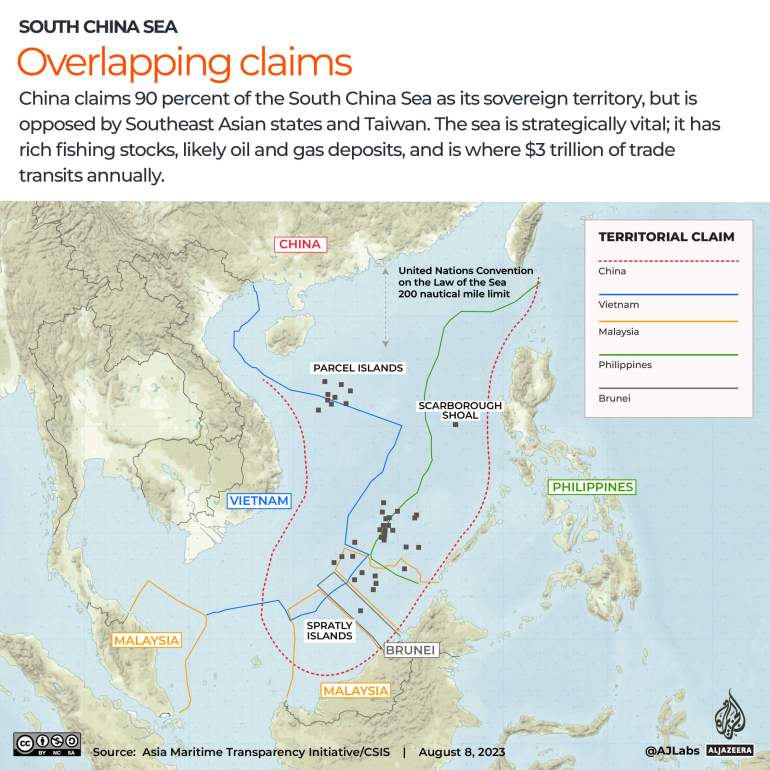Vietnam and the Philippines have agreed to cooperate on maritime security in the South China Sea, that is claimed by Beijing almost in its entirety.
The deals, signed during a state visit to Hanoi by President Ferdinand Marcos Jr on Tuesday, will see the two countries’ coastguards working together to prevent and manage incidents in the disputed waters.
The South China Sea is at the centre of territorial tussles between China, the Philippines and other countries. China claims almost the entire sea as its sovereign territory, while the Philippines, Vietnam and other Southeast Asian nations claim various islands, islets, reefs and shoals around their coasts.
An estimated $5 trillion in international trade passes through the waters each year.

Tensions between the Philippines, a United States ally, and China have intensified in recent months.
At the end of last year, the Philippines accused China of “swarming” the Whitsun Reef off its coast. China, for its part, accused the Philippines of “provocations” at disputed Second Thomas Shoal where Manila has complained about the Chinese coast guard’s use of water cannons, a military-grade laser and dangerous blocking manoeuvres leading to ship collisions.
Earlier this month, China held military drills in the South China Sea as the US and the Philippines conducted their own joint exercises in the same waters.
The high-seas faceoffs are fuelling fears of a wider conflict.
Strategic partners
Vietnam and the Philippines have signed two agreements on “incident prevention in the South China Sea” and “maritime cooperation” among coastguards, said a Vietnamese official.
The deals could irritate Beijing, particularly if they pave the way to compromises between the signatories on their own competing claims.
Marcos said Vietnam was “the sole strategic partner of the Philippines” in Southeast Asia, stressing that maritime cooperation was the foundation of that relationship.
Vietnamese Prime Minister Pham Minh Chinh said Marcos’s visit had helped boost bilateral relations.
“The world and regional situation is evolving in a rapid and complicated manner and therefore we need to unite and cooperate more closely,” he said.
The two countries’ leaders met after foreign ministers from the Association of Southeast Asian Nations (ASEAN) met in Laos and “underscored the importance of the full and effective” implementation of the declaration on conduct in the South China Sea that the bloc agreed with China in 2002 and 2012.
“We reaffirmed the importance of maintaining and promoting peace, security, stability, safety and freedom of navigation in, and overflight above, the South China Sea,” the foreign ministers said in a statement.
The Philippines and Vietnam and both members of ASEAN, which has been trying to agree a code of conduct with Beijing for the South China Sea for years without success.
Several ASEAN nations brought up the tensions in the South China Sea, Laos’s Foreign Minister Saleumxay Kommasith told reporters, who added that Laos hoped to have a third reading of the code of conduct with China “as soon as possible.”
“That would create an environment where both ASEAN member states, especially the claimant states, and China can build more trust and confidence,” he said. “Whatever happens in the South China Sea should be resolved in a peaceful manner through dialogue and consultations.”
Saleumxay said all sides with claims in the South China Sea needed to respect the United Nations convention on the law of the sea.
Under that convention, a United Nations-backed tribunal ruled in 2016 that China’s expansive claims were without merit. China ignored the ruling.
Trade ties
The agreements between the Philippines and Vietnam on maritime cooperation were accompanied by efforts to bolster trade ties.
The two countries signed a five-year trade commitment on food security, with Vietnam agreeing to supply up to 2 million tonnes of white rice to the Philippines “amidst the impact of climate change, pandemics, and other external events”.
Before meeting Vietnamese political leaders, Marcos met Pham Nhat Vuong, the head of Vingroup, Vietnam’s largest conglomerate, on Monday.
The company announced the next day that its electric car unit, VinFast, would open a business network in the Philippines.
According to Vingroup’s statement, Marcos said the Philippines could help in the production of batteries for electric vehicles, thanks to its reserves of cobalt, copper and nickel.
https://news.google.com/rss/articles/CBMib2h0dHBzOi8vd3d3LmFsamF6ZWVyYS5jb20vbmV3cy8yMDI0LzEvMzAvdmlldG5hbS1waGlsaXBwaW5lcy1zaWduLWRlYWxzLW9uLXNlY3VyaXR5LWluLWRpc3B1dGVkLXNvdXRoLWNoaW5hLXNlYdIBc2h0dHBzOi8vd3d3LmFsamF6ZWVyYS5jb20vYW1wL25ld3MvMjAyNC8xLzMwL3ZpZXRuYW0tcGhpbGlwcGluZXMtc2lnbi1kZWFscy1vbi1zZWN1cml0eS1pbi1kaXNwdXRlZC1zb3V0aC1jaGluYS1zZWE?oc=5
2024-01-30 21:18:36Z
Tidak ada komentar:
Posting Komentar